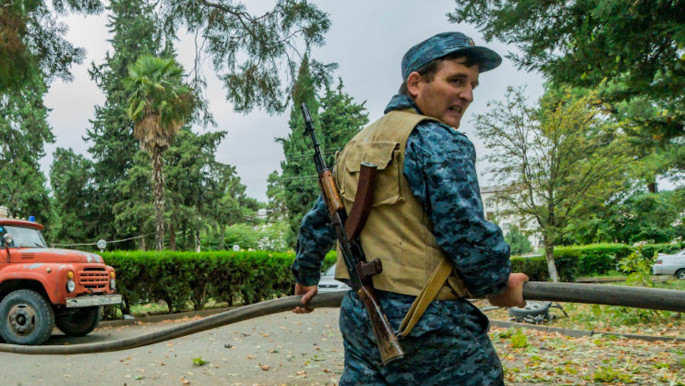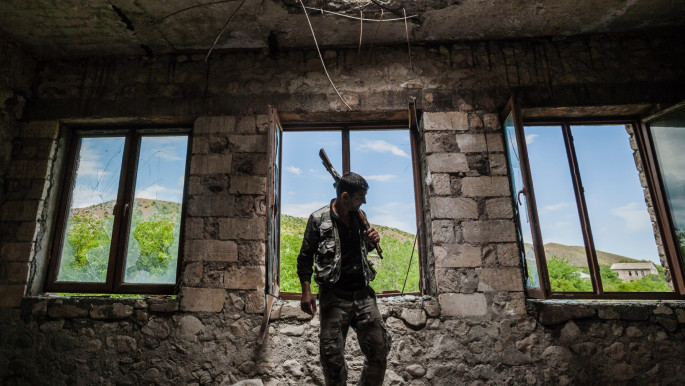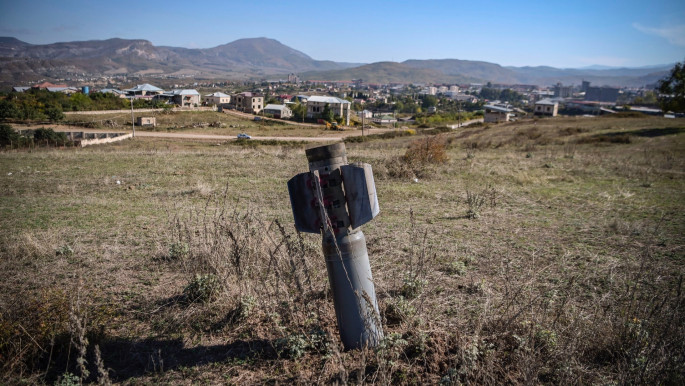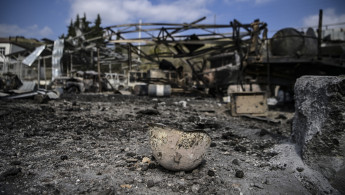Russia and Turkey's delicate balancing act in Nagorno-Karabakh
The conflict has killed thousands and left over 100,000 displaced since September. It was the latest escalation in a "frozen conflict" that has endured for decades.
Though Moscow's ceasefire agreement on 9 November indicates that both Russia and Turkey – two key external actors in the conflict - can once again cooperate despite their differences, a prioritisation of geopolitical goals without proactive efforts to resolve tensions on-the-ground could leave lasting peace between Azerbaijan and Armenia a distant prospect.
After capturing key parts of the Nagorno-Karabakh region, Baku on Sunday announced it would extend the deadline for Yerevan's withdrawal of what it called "Armenian armed forces and of illegal Armenian settlers" from the territory it considers "occupied."
Many Armenians living in the territory, which Yerevan had controlled since 1994, fled and burnt their houses down. The territory is recognised as part of Azerbaijan, but Armenia previously controlled it and ethnic Armenians form the majority there.
 |
Nagorno-Karabakh is another stage in Russia and Turkey's evolving relationship, where both countries employ pragmatism to resolve their foreign policy differences |  |
Moscow deployed hundreds of peacekeeping troops on the streets of Nagorno-Karabakh on 10 November. This raised hopes that an end will come to a deadly conflict in which mortars and artillery were used indiscriminately, with both sides accusing the other of breaking previous ceasefires.
However, Moscow has pursued a careful balancing act, rather than looking to achieve lasting peace. Russia has a key defence pact with Armenia and a military base there, though it also sells weapons to Azerbaijan, making Moscow a key powerbroker.
 |
|
| Read more: How the Armenia-Azerbaijan conflict could spiral into a proxy war |
After all, Russian President Vladimir Putin previously stressed that both Yerevan and Baku are "equal partners." Moscow would ideally prefer to retain leverage over both post-Soviet Union countries.
On the other hand, Turkey has backed Azerbaijan, having maintained strong military ties with Baku for decades, with Turkish President Recep Tayyip Erdogan saying he would support Azerbaijan "on the battlefield or the negotiating table." Turkey was the first country to recognise Azerbaijan's post-Soviet Union independence in 1991, while it has no diplomatic relations with Armenia.
Ankara's stance prompted Moscow to adapt. Despite its strong ties with Armenia prior to the conflict, Moscow likely feels its best interests were in keeping the conflict 'semi-frozen.' After all, Russia's Foreign Ministry said it would deliver "all necessary assistance" to its ally Armenia should the conflict transgress the Nagorno-Karabakh region, showing it wants to maintain the status quo.
Other countries have played a subtle yet visible role in backing the warring sides. There has been some reported domestic support for Azerbaijan within Iran, including demonstrations of solidarity in northern cities close to the Azerbaijani border.
 |
A vacuum has emerged following an incoherent position from other international actors over the conflict, allowing Russia and Turkey to move in and become dominant actors |  |
However, Iran has also deepened ties with Armenia, with rumours circulating on social media of Iranian trucks delivering military equipment to Yerevan. According to analyst Maysam Behravesh, "the prevailing perception in Tehran is that Azerbaijan's recapture and control of Nagorno-Karabakh will likely to fuel Turkish/Azerbaijani separatist sentiments and ambitions in Iran's adjacent provinces in the northwest, which could threaten its national security and territorial integrity."
Therefore, despite its relations with Baku, Tehran would have preferred that Armenia held back Azerbaijan. Though it will be comfortable with Russia maintaining the divided status quo, which hinders Baku's hegemony. Iranian President Hassan Rouhani praised the "agreement facilitated by Russia," adding his hopes that the "conflict will be settled peacefully."
Moreover, Israel has surprised some observers by providing military and humanitarian aid to Azerbaijan, per its years-long cooperation with Baku. This gives Tel Aviv access to Baku's energy resources and allows it to monitor its regional nemesis Tehran.
 |
|
| Read more: How rivals Turkey, Israel and Pakistan ended up siding with Azerbaijan |
However, the two key actors here are Moscow and Ankara. Azerbaijan had the edge, largely in part due to assistance from Turkey, though Russia managed to push for diplomacy to prevent Armenia from being overwhelmed.
Nagorno-Karabakh is another stage in Russia and Turkey's evolving relationship, where both countries employ pragmatism to resolve their foreign policy differences. This became the case after they previously established a ceasefire when the conflict flared up between Azerbaijan and Armenia in April 2016.
A vacuum has emerged following an incoherent position from other international actors over the conflict, allowing Russia and Turkey to move in and become dominant actors. The United States under incumbent President Donald Trump has taken a withdrawn role on such conflicts, and Washington's paralysis will continue with the recent elections and the transitional period until January.
 |
A prioritisation of geopolitical goals without proactive efforts to resolve tensions on-the-ground could leave lasting peace between Azerbaijan and Armenia a distant prospect |  |
The European Union (EU) has also failed to take serious diplomatic initiatives, and it is also divided – in part owing to French President Emmanuel Macron's adventurism and desires to contain Turkey. Even with Nagorno-Karabakh, though France said it would support a balanced peace solution for both sides, Macron previously stated he "stands by Armenia" during the conflict's onset, while criticising what he called Turkey's "warlike" rhetoric.
Though Russia and Turkey are in a key position to mediate, this latest Russia-led initiative alone may not achieve lasting peace. Such a pattern has emerged in other conflicts, as Turkey and Russia have emerged as dominant powerbrokers, while the US and EU have failed to act.
 |
|
| Read more: Iran's dilemma in Nagorno-Karabakh |
In Syria and Libya, Moscow has backed the Assad regime and the warlord Khalifa Haftar respectively, while Ankara has supported the Syrian opposition and the internationally recognised Government of National Accord (GNA).
As a result, Turkey has managed to curtail Russia's influence in both countries, forcing Moscow to compromise and take a balanced position. Its support for the Syrian opposition in the rebel-held enclave in Idlib prevented Assad from conquering it during Syria's civil war.
And after Ankara intervened to assist the GNA in Libya, this too pushed Haftar back and forced Moscow to recalculate its policies, leaving both Russia and Turkey as leading power brokers.
However, instability has remained in both Syria and Libya, and risks continuing, as there have been only weak efforts from other external actors to pursue a solution that can ease domestic tensions.
While Nagorno-Karabakh may tell a different story, as Russia has shown it will continue to lead diplomatic initiatives, a balancing act between Moscow and Ankara, and also Iran, will ensure that the conflict remains 'frozen'. Moreover, ongoing tensions between Armenia and Azerbaijan will reflect the failure of the international community to act.
Diplomacy between the two warring sides could be a distant prospect, meaning it will be hard to achieve a long-term resolution between Yerevan and Baku, which even the ceasefire in 1994 and subsequent peace initiatives failed to facilitate.
Jonathan Fenton-Harvey is a journalist and researcher who focuses on conflict, geopolitics and humanitarian issues in the Middle East and North Africa
Follow him on Twitter: @jfentonharvey



